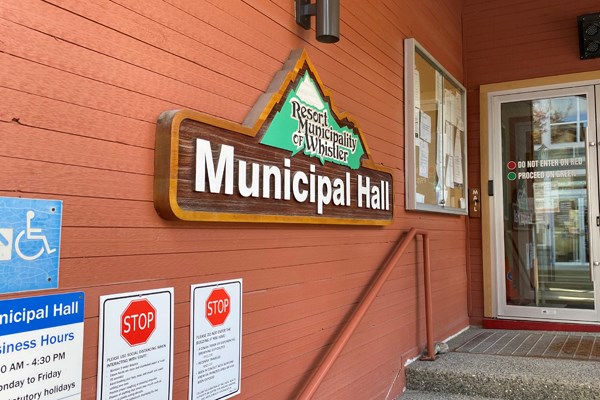Local builders are applauding an update to the Resort Municipality of Whistler (RMOW) land-use procedures and fees bylaw designed to reduce red tape at municipal hall.
Given first three readings on Sept. 20 and adopted on Oct. 4, the proposed bylaw will streamline the permitting approval process by delegating some decision-making authority to RMOW staff. In alignment with the new Official Community Plan, the update will also establish precise development approval information requirements for zoning amendments, development permits (DP) and temporary-use permits (TUPs).
“The process efficiencies will result in cost and staff time savings,” said RMOW manager of development planning Melissa Laidlaw in a report to council on Sept. 20.
“So it’s not just planning staff, but you have to consider all the staff that are involved in attendance at a council meeting, preparing the package, preparing the minutes, so it’s just cost and staff time-saving.”
The bylaw changes are profound, as far as municipal land-use policy goes, and designed to lighten the planning department’s workload. For example, the bylaw will change how minor development variance permits (DVP) are issued from something that requires a council resolution to a simple staff decision.
Chris Addario, president of the Sea to Sky Home Builders Association, welcomed the new bylaw, and attempts by the RMOW to streamline the permitting process.
“Generally, from what I see, this bylaw is a good thing, because it’s spreading some of the workloads across different members in the planning department. There’s still senior staff that these things are assigned to, but they’re taking a lot of this off,” Addario said.
“What they’re trying to do is streamline some of these things and not necessarily have to go to council all the time to make decisions. And, as well, move some of the decision-making around the planning department, which would make sense.
“Anything that helps streamline the process is going to help. Delays cost money.”
Following the COVID-19 pandemic and subsequent ransomware attack in 2021, the RMOW has been dealing with an ongoing permitting backlog which has increased the time it takes to get shovels in the ground on new projects. According to local builders, it can take months to get approvals under Whistler’s current permitting process.
That is partly because under the current model, RMOW staff must bring all DP and DVP applications before council, each of which comes with a report that can vary considerably in size and complexity.
The RMOW estimates that, on average, between 20 and 40 hours of staff time will be saved for each delegated DP and DVP, as staff will also save time not having to create a report to bring to council.
The updated bylaw is made possible thanks to last year’s amendments to the provincial Municipal Affairs Statutes Amendment Act, which the provincial government designed to improve municipal approval processes and enable local governments to delegate decisions on minor DVPs to staff.
The updated bylaw also defines what constitutes a minor development variance that can be delegated—things such as building setbacks, tandem parking, and building height regulations.
Developer Rod Nadeau, founder of Innovation Building Group, also welcomed the changes.
“They’re basically catching up to what other municipalities do,” he said. “I mean, the fact that you need a variance for a setback for a post for your deck, that staff has to do a whole report to council is a complete waste of time ... It should actually be dealt with at the staff level.”
In addition to the permitting process changes, the bylaw includes a $2,400 application fee for non-delegated TUPs based on the estimated average amount of staff time it takes to process such a permit.
The RMOW will also do a full review of the fee structure associated with permitting and development services, a change intended to improve transparency around how much permitting fees will cost applicants and better reflect the cost recovery of the permitting process.
“We are enthusiastic about opportunities to improve our permitting process,” said Mayor Jack Crompton.
“This is a super exciting move for our community, and we look forward to speeding up the process.”




